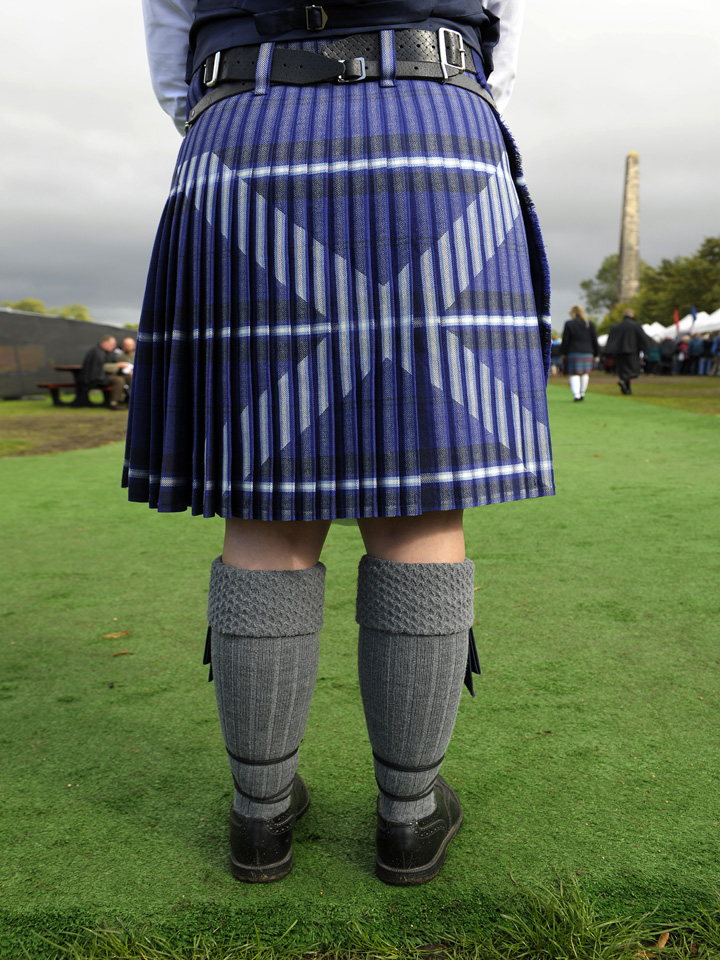Filtered By: Lifestyle
Lifestyle
Kilts, whisky and deep-fried Mars bars: Scottish cliches busted

UNITED KINGDOM, GLASGOW : A woman wears a kilt with the Scottish flag on it in Glasgow, Scotland on August 16, 2014. A month to the day until Scotland votes on whether to split from Britain, opinion polls Monday showed the pro-independence camp gaining ground as First Minister Alex Salmond insisted his side had a "spring in their step". But the polls still showed a strong lead for the 'No' camp ahead of the vote on September 18, suggesting voters are on course to reject independence. Debate in the campaign has so far focused on Scotland's economy, particularly on the currency post-independence. AFP PHOTO/ANDY BUCHANAN
Cliches about Scots tend to involve kilts, ruddy complexions and whisky, or throwing tree logs in the air for fun—a traditional martial sport known as caber-tossing.
But are they true? Here is an informal look at five common cliches about Scots, as they prepare to vote in a historic independence referendum next week:
Miserly Scots?
FALSE - The idea of a Scot enjoying a drink but being reluctant to pay for it is a persistent stereotype.
"Originally it reflected Scots' poverty and then became complimentary, focussing on the fact that Scots are very good at money, good at business," said Murray Pittock, a historian and literature professor at the University of Glasgow.
Many studies have shown the penny-pinching reputation is way off, including a poll from last year that found Scots on average give £365 pounds (455 euros, $587) a year to charity compared to £268 pounds for wealthier Londoners.
Bad diets?
EXAGGERATED - Scottish cuisine includes many alternatives to the much-loved haggis—a stuffed sheep's stomach. But bad diets are a problem and alcohol consumption is high compared to other parts of the United Kingdom.
"Is it true? In parts of Scotland yes, in particular in the wet parts of Scotland, in the west," Pittock said.
The Scottish national health service said bad eating habits partly explain a life expectancy that is lower than in England and Wales—76.5 years for a boy born in 2012 and 80.7 years for a girl.
Often held up as an example is fried food, including the notorious deep-fried Mars bar. Pittock dismissed the chocolate calorie bomb as "largely exaggerated" and "a bit of a legend".
Hard to understand?
SOMETIMES - Heavily Scottish-accented English can be hard for an English person or foreigner to understand but should not be confused with Scottish Gaelic, a distinct Celtic language that is only spoken by a small minority.
"That tends to be post-1940/1950 when you started to hear on national radio and later on TV, union leaders of the west of Scotland speaking with a thick accent and they were rather difficult for people in England to understand," Pittock said.
The professor said Scottish speakers then were sometimes subtitled on television, but there is now greater pride in accents that people would have tried to tone down in the past. Additionally, there is a general tendency for accents in Britain to be more uniform.
Patriotic Scots?
TRUE - A recent study found that 69 percent of Scots feel "Scottish first" and 20 percent feel "British first". In comparison, the number of English people who feel "English first" is just 43 percent.
"As a small country, a very marginal place in the European world geographically, Scotland has always had some strong form of patriotism," Pittock said.
"The idea has a long heritage going back to the Middle Ages," he said, pointing to the French proverb —"proud as a Scot".
Some of the patriotism is associated with anti-Englishness.
As one Scottish comedian, Frankie Boyle, quipped: "In Scotland we have mixed feelings about global warming, because we will get to sit on the mountains and watch the English drown."
Kilt-wearing?
TRUE - Or at least it used to be. A type of woollen multi-coloured cloth, kilts were the traditional attire for men from the Highlands since at least the 16th century and they are one of the most popular symbols of Scotland.
Kilts are rooted in history and are associated with patriotism as they were banned following the Jacobite uprising in the 18th century and only re-introduced in the army.
"Obviously, most Scots don't wear kilts every day," Pittock said, adding: "Kilts, bagpipes, tartan are all rather kitsch interpretations of Scotland but people are embracing them, saying at least it is a visible brand".
Asked what they wear underneath, if anything, Scottish men like to joke they have "the future of Scotland". — Agence France-Presse
More Videos
Most Popular




